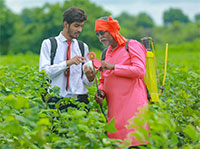About
Pesticide Action Network (PAN) is a network of over 600 participating nongovernmental organizations, institutions and individuals in over 90 countries working to replace the use of hazardous pesticides with ecologically sound and socially just alternatives. PAN was founded in 1982 and has five independent, collaborating Regional Centers that implement its projects and campaigns.
PAN International’s achievements include:
2013 – Delegates to the Stockholm Convention agree that agroecology is the best alternative to the hazardous pesticide endosulfan.
2011 – 173 countries agree to add endosulfan to the POPs treaty list for elimination.
2011 – After four days, a jury at the international Permanent People’s Tribunal, in Bangalore, India, found the six corporations that dominate the global pesticide industry guilty of human rights violations.
2008 – The International Assessment of Agricultural Knowledge, Science and Technology for Development of the UN’s report, Agriculture at a Crossroads, co-authored by PAN, finds that small-scale, agro-ecological farming is most likely to feed the world, while protecting crucial ecological resources without which food production systems around the world are likely to collapse.
2006 – UN’s Food and Agriculture Association (FAO) recommends banning
highly hazardous pesticides.
2004 – By 2010 the Rotterdam Convention is adopted by 134 countries, and 40 chemicals (including 29 pesticides) are included on the PIC list, requiring notification to importing countries.
2003 – PAN confronts the World Bank on its failure to implement its stronger integrated pest management policy, with only 9% of projects showing progress.
2001 – After several years of negotiation and deep citizen engagement, a strong POPs treaty–the Stockholm Convention–is signed in Sweden, and implemented in 2004.
1998 – PAN’s intensive campaign with partners around the world wins improved policies regarding pesticides at the World Bank.
1998 – After a decade of work by PAN activists, one of the network’s founding principles is enshrined in a global treaty: the Rotterdam Convention on Prior Informed Consent (PIC Treaty).
1997 – PAN and environmental health movement leaders create a global network to press for creation of a strong persistent organic pollutants (POPs) treaty.
1996 – PAN leads community monitoring in China, Indonesia and Mexico that documents World Bank projects increasing pesticide dependence.
1989 – PAN convinces the UN Food and Agriculture Organization that all countries have a right to “prior informed consent” when they import banned chemicals.
1985 – The global Dirty Dozen campaign is PAN International’s first joint effort, spurring global attention to pesticide poisonings.
1982 – At PAN’s founding meeting in Malaysia, groups vow to stop the export of hazardous, banned pesticides to the Global South.

 We are collecting individual signatories from around the world to call on the FAO to stop its #ToxicAlliance with CropLife. Sign on and get others to do the same!
We are collecting individual signatories from around the world to call on the FAO to stop its #ToxicAlliance with CropLife. Sign on and get others to do the same!